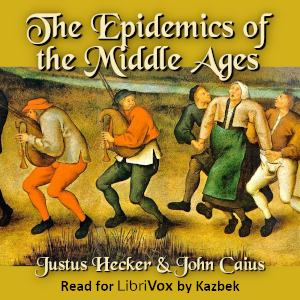
Justus Friedrich Carl Hecker (1795-1850) was a German physician and medical writer, whose research focused on the history of epidemics, in a broad sense of the term that included pandemics like the Black Death as well as the group of social phenomena known as dancing mania. The Epidemics of the Middle Ages comprises three of his works — The Black Death, The Dancing Mania, and The Sweating Sickness — translated by the English epidemiologist Benjamin Guy Babington. Despite what the name of the book may suggest, the events it describes are not limited to the Middle Ages.
The Black Death recounts the history of the bubonic plague in Europe, with particular attention to its cultural ramifications, such as the Flagellant movement and persecution of the Jews. The Dancing Mania describes mysterious social phenomena that occurred mainly in Europe between the 14th and 17th centuries, in which groups of people engaged in apparently uncontrollable dancing. The nature of the dancing mania continues to be a subject of debate, and Hecker’s book remains one of its most comprehensive descriptions. The Sweating Sickness was a series of epidemics that struck England and later continental Europe during the 15th and 16th centuries. Hecker’s account pays particular attention to its impact on political history.
Hecker’s books were written before the germ theory of disease became widely accepted. While his accounts of epidemics are based on critical examination of historical evidence, modern readers are likely to disagree not only with his epidemiological theories, but also with his assessments of the evidence itself. These disagreements can provide a striking illustration of how the prevailing views of one’s time may affect one’s judgements about credibility of primary sources.
The audiobook includes appendices which contain source materials, including (for The Sweating Sickness) a 1552 treatise by the English physician John Caius and (for The Dancing Mania) examples of music as well as short texts in Latin, German, and the early modern German dialect of Cologne.(Summary by Kazbek)

Other Audiobook
Audiobook: The Chemical History of a Candle
The Chemical History of a Candle is a series of 6 lectures on chemistry presented
Audiobook: If Winter Don’t
Barry Pain’s parody takes a sharp knife to ASM Hutchinson’s best selling novel ‘If Winter
Audiobook: Witches’ Brew (MacBeth Act IV Scene I)
Librivox volunteers bring you seven readings of The Witches’ Brew from Act IV Scene I
Audiobook: Lives of the Most Eminent Painters, Sculptors and Architects Vol 3
The Lives of the Most Excellent Italian Painters, Sculptors, and Architects, from Cimabue to Our
Audiobook: Bird Study Book
Do you enjoy bird watching? Would you like to learn a little more about the
Audiobook: Bible (ASV) 05: Deuteronomy
“Deuteronomy (Greek: Δευτερονόμιον, “second law”) or Devarim (Hebrew: דְּבָרִים, literally “things” or “words”) is the
Audiobook: Bible (ASV) 34: Nahum
Nahum prophesied, according to some, in the beginning of the reign of Ahaz (740s BC).
Audiobook: Edward II
Christopher Marlowe’s Elizabethan tragedy focuses on the downfall of King Edward II, whose love for
Audiobook: Great Events by Famous Historians, Volume 8
A comprehensive and readable account of the world’s history, emphasizing the more important events, and
Audiobook: Short Poetry Collection 232
This is a collection of 42 poems read in English by LibriVox volunteers for September
Audiobook: Stories from the Trenches: Funny Tales the Soldiers Tell
Carleton B. Case is well known for wit and humor, as the title of the
Audiobook: Birds and All Nature, Vol. V, No 5, May 1899
“Birds and All Nature” was a monthly publication of the Nature Study Publishing Company of